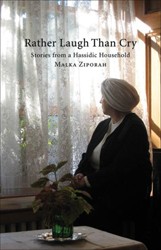In the past few years, a new genre of Jewish literature has carved out a niche in the readers’ market: ex-frum/ex-Hasidic memoirs. Chaya Deitsch’s memoir is thematically similar to works by Deborah Feldman, Leah Vincent, Shulem Deen, and Leah Lax. Each of these writers describes the personal journey and thought processes that informed his or her decision to leave the ultra-Orthodox world — a step that often means leaving loved ones behind.
Chaya Deitsch’s Here and There: Leaving Hasidism, Keeping My Family adds a new dimension to this genre: not all parents shun their children who leave the fold. Deitsch’s story may provide comfort and resolution to those who still shudder to think about the tragic death of ex-Hasid Faigy Mayer this past July, and the public discovery that Mayer was excommunicated by her parents. By contrast, Deitsch’s memoir depicts a childhood of love and support, as well as both parents’ acceptance for the path she chose.
The beginning of the memoir pulls in the reader as the author describes her affection for her Lubavitch family members. Never has she doubted feeling special and loved; throughout her story, she expresses appreciation of her parents for staying connected to her despite her choosing a lifestyle that contradicts their own. Dietsch’s dilemma is that she does not want to grow up to become a traditional Lubavitch wife and a mother. Rather, she wants the freedom to be intellectually challenged.
In addition to describing her own journey, Dietsch educates the reader about the subtle differences between the many sects of ultra-Orthodox Jews, including details and insights that can only emerge from an insider’s perspective. While such tangents can be enlightening, they can also be distracting. Perhaps more emphasis on the narrative and less of a focus on descriptive details would have made the memoir’s core objectives less ambiguous.
Dietsch’s ultimate contribution to this admittedly new genre stems from her ability to have her cake and eat it too, asserting her needs while maintaining her relationships with her family — a goal to which all of us can aspire. The memoir’s gravitas lies less in the author’s personal struggles and more in what the reader can glean about maintaining family relationships even when the stakes are higher. Dietsch’s parents’ unconditional love is both enviable and heroic.




